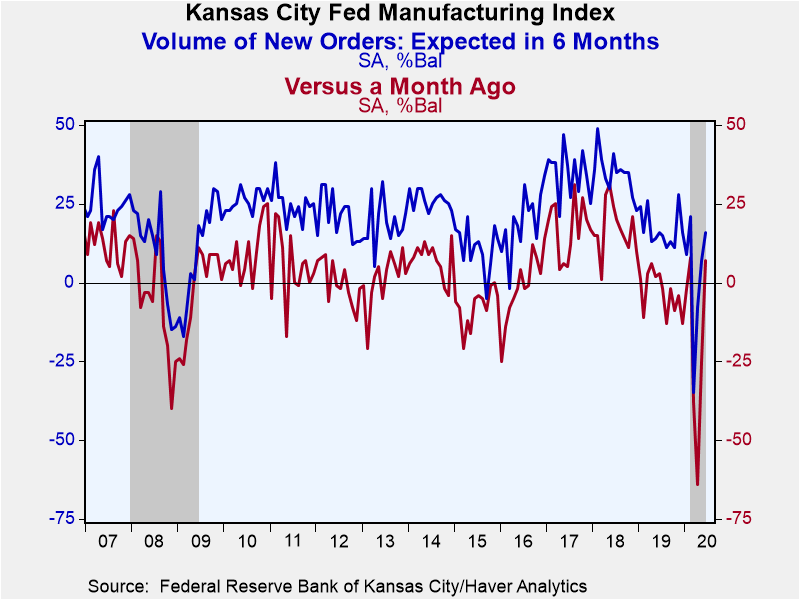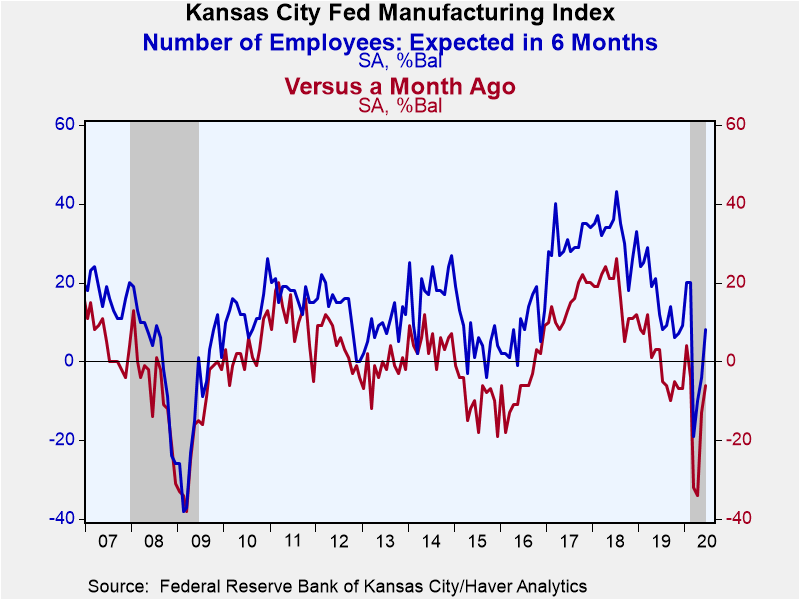 Global| Jun 25 2020
Global| Jun 25 2020Kansas City Fed Factory Index Turns Positive in June; Component Improvement Is Broad-based
by:Tom Moeller
|in:Economy in Brief
Summary
• Midwest economic activity increases. • New orders and production lead gains this month. • Expectations rise as well. The Federal Reserve Bank of Kansas City reported that its manufacturing business activity index increased to 1 [...]
• Midwest economic activity increases.
• New orders and production lead gains this month.
• Expectations rise as well.
The Federal Reserve Bank of Kansas City reported that its manufacturing business activity index increased to 1 during June after three consecutive negative readings. It indicated a roughly stable level of activity following a sharp factory recession. The index of expectations in six months also turned positive with a reading of 9 following three consecutive months of declining activity.
The ISM-Adjusted Index rose to 52.4 (NSA) in June from 42.4 in May. It was the first index level above break-even level since February, but still below the May 2018 high of 64.2.
All of the current conditions components, including new orders, shipments and production strengthened this month. The employment index was less depressed. The employee workweek reading of zero followed seven consecutive figures below zero. The export measure remained negative, but was improved from even deeper readings below zero in the prior three months.
On the inflation front, the prices received index for finished products turned positive for only the second month in the last seven. At 7, it still was below a high of 27 in August 2018. The raw materials prices index of 1 followed three negative figures. It was down, however, from its level of 50 in July 2018.
The index measuring expectations in six months turned positive as shipments, new orders, employment and production each moved above zero.
Expected finished product prices remained in positive territory in June. Expected raw materials prices also were firm.
The diffusion indexes are calculated as the percentage of total respondents reporting increases minus the percentage reporting declines. The survey includes 93 responses from plants in Colorado, Kansas, Nebraska, Oklahoma, Wyoming and northern New Mexico and was conducted mid-month. Data for the Kansas City Fed Survey can be found in Haver's SURVEYS database.
| Kansas City Federal Reserve Manufacturing Survey (SA) | Jun | May | Apr | Jun'19 | 2019 | 2018 | 2017 |
|---|---|---|---|---|---|---|---|
| Conditions Versus One Month Ago (% Balance) | 1 | -19 | -30 | 0 | 0 | 17 | 14 |
| ISM-Adjusted Composite Index (NSA) | 52.4 | 42.4 | 37.6 | 51.5 | 50.0 | 58.9 | 56.7 |
| New Orders Volume | 7 | -25 | -64 | 3 | -3 | 17 | 17 |
| Number of Employees | -6 | -13 | -34 | 3 | -1 | 17 | 15 |
| Production | 2 | -25 | -62 | -2 | 2 | 19 | 17 |
| Prices Received for Finished Product | 7 | -9 | -14 | 5 | 7 | 22 | 7 |
| Expected Conditions in Six Months | 9 | -2 | -6 | 10 | 12 | 28 | 26 |
| New Orders Volume | 16 | 7 | -8 | 16 | 17 | 35 | 35 |
| Number of Employees | 8 | -4 | -10 | 12 | 15 | 33 | 39 |
| Production | 14 | -2 | -8 | 20 | 19 | 40 | 40 |
| Prices Received for Finished Product | 13 | -5 | 2 | 30 | 26 | 42 | 27 |
Tom Moeller
AuthorMore in Author Profile »Prior to joining Haver Analytics in 2000, Mr. Moeller worked as the Economist at Chancellor Capital Management from 1985 to 1999. There, he developed comprehensive economic forecasts and interpreted economic data for equity and fixed income portfolio managers. Also at Chancellor, Mr. Moeller worked as an equity analyst and was responsible for researching and rating companies in the economically sensitive automobile and housing industries for investment in Chancellor’s equity portfolio. Prior to joining Chancellor, Mr. Moeller was an Economist at Citibank from 1979 to 1984. He also analyzed pricing behavior in the metals industry for the Council on Wage and Price Stability in Washington, D.C. In 1999, Mr. Moeller received the award for most accurate forecast from the Forecasters' Club of New York. From 1990 to 1992 he was President of the New York Association for Business Economists. Mr. Moeller earned an M.B.A. in Finance from Fordham University, where he graduated in 1987. He holds a Bachelor of Arts in Economics from George Washington University.










